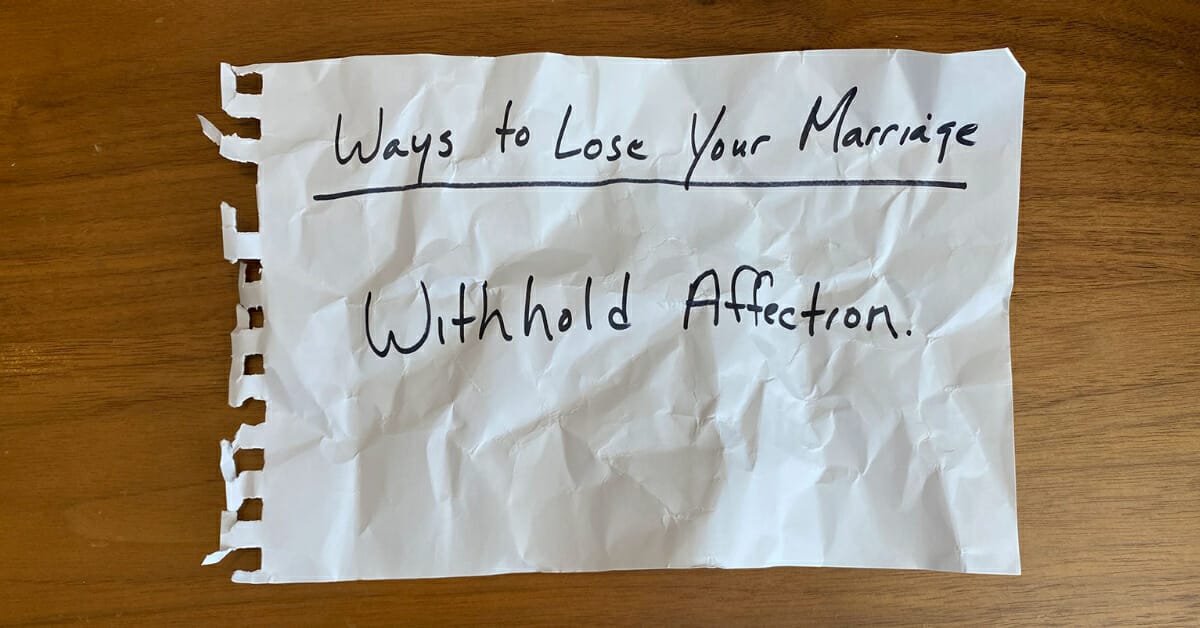Withholding affection is another item on the list of ways you can lose your marriage. If this seems obvious, it’s because so many spouses feel a great lack of affection in their marriage.
AFFECTION
Now I know the word “affection” can sound a little mushy and sappy. It can sound like something you would read on a touchy-feely Hallmark card.
So let me define affection simply and easily. Affection is…Helping someone feel loved and longed for. And just like acceptance and appreciation, affection is not so much about what you feel. It’s more about what you do!
WHY AFFECTION IS IMPORTANT
I don’t care how young or old you are, everyone wants to feel loved and longed for. That’s why both children and adults say things like:
- Did you miss me?
- Do you love me?
- If you really loved me, you would…
- How much do you love me?
We say these things because we all want to feel loved and longed for…
- By our spouse or significant other.
- By our parents.
- By our kids.
Yet we don’t always feel loved or longed for. And when we don’t feel that…it hurts and it leads us to feel insecure or unwanted. It may even prompt us to look elsewhere for the affection we crave.
Now no one is perfect. People have things going on in their hearts, minds, and lives that will sometimes get in the way of them showing us the affection we desire. And when we’re not feeling loved and longed for by others, it’s hard to show affection back. You may even need to address those feelings with certain people.
But, you can still show them affection.
HOW TO SHOW AFFECTION
So how can you show affection to people…especially to those who aren’t showing it to you?
I’m going to give you 3 ways that you can show affection. And these are effective not only between spouses in marriage but in almost any relationship.
To start…
SHARE with them.
When I was growing up, I had to share a room with two brothers. So I had a special place in my room where I would hide things I didn’t want my brothers to get. When I became a parent, I would still hide things. Only now, I would hide chocolate in the house, because I didn’t want my kids to get it.
There’s something about us that leads us to be stingy with things.
But if you want to show affection to someone, you share what you have with them. It could be the last piece of desert, your seat, or even the TV remote. (This last one is a hard one for me.)
Why does sharing with someone help them feel loved and longed for? Because it shows them they’re more important to you than your stuff. Sharing with others is a great first step to showing affection.
Next, you can…
SERVE them.
Serving is a great way to show someone affection. Serve them, not because you have to, but because you want to…because you care for them.
Think about a time when someone served you…just because. Didn’t that make you feel loved?!
I remember one fall day when I needed to rake my yard. it was the end of a very difficult week, and the yard was thick with leaves. I just didn’t feel I had it in me to take on this job. Still, it needed to be done. So I got out the rake and went to work. But a few minutes into it, I was already exhausted. I looked at the yard and thought, “I’ve barely made a dent in this. I’m going to be here all day!”
Just then, a pickup circled our cut-de-sac for the second time. But this time, the truck pulled up in front of our house. Out stepped a young man in his late teens or early 20’s. He walked up, introduced himself, and said, “Can I help you with the yard?”
Not being someone who’s good at receiving help, I said, “Oh no. That’s awfully nice of you, but I can get it.”
But, this young man would not be deterred. He kept insisting until I finally caved and agreed. He jumped in his truck and quickly came back with a rake, and a wheelbarrow and went to work. And in no time, the whole yard was raked clean.
I thanked him again and again for being so kind to stop and help. I tried to pay him, but he wouldn’t accept it. He told me that since he was a small child, he had been taught by his parents and his church that he should love others and that it was just the thing to do.
I shook his hand again, thanked him again, and watched him drive off. And as he drove away, I felt loved…because he had freely served me.
Never miss an opportunity to serve someone…especially your spouse.
But there’s one more thing you can do to help your spouse (and others) feel loved and longed for…
SACRIFICE for them.
What does it mean to sacrifice yourself for someone? It means you’re willing to go through hard times so they don’t have to. Ask yourself…
Am I willing to go through difficulties so my spouse (or someone else) doesn’t have to?
What are some ways I could sacrifice my wants, needs, and desires for them?
There is no greater sign of affection than sacrificing for someone else. In the New Testament, Jesus said: “Greater love has no one than this, that someone lay down his life for his friends”. (John 15:13)
Sacrifice is the ultimate act of affection.
A FINAL WORD…
Sharing. Serving. Sacrificing. These are the things that show your spouse (and others) that they are loved and longed for. These are the behaviors that show affection.
You may be waiting to get these things before you give them, but waiting for your spouse to go first doesn’t really work. (Check out my Normal Marriage post entitled “The List – Wait for Your Spouse to God First.”)
When you share, serve, and sacrifice for another, you’re not only helping them to feel loved and longed for, you’re also showing them a higher plane of existence…much as the New Testament portrays Jesus. But…when you fail to show affection and you fail to help people feel loved and longed for, you do damage to the relationship and the marriage. And that’s why this one is…on the list.




